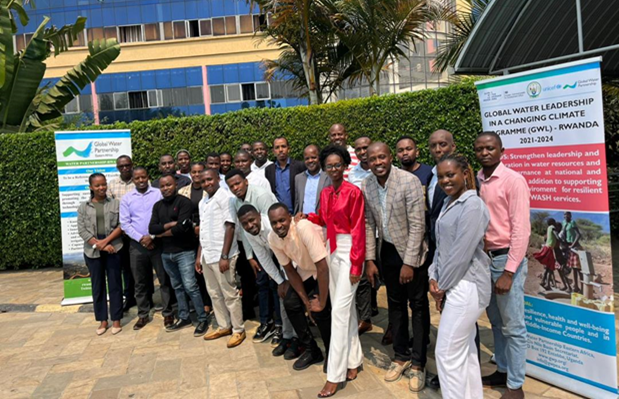“The opportunity provided by GWL-Programme, to develop a response strategy to overcome the prioritized bottlenecks that are impending IWRM and WASH, should be the core basis of the government institutions and other partners to mobilize more resources”. This was revealed by Mr. François Tetero, Chairperson of Water Partnership - Rwanda and Regional Steering Committee of Global Water Partnership Eastern Africa (GWPEA), during the inaugural session of a three-day workshop convened in Musanze District, Rwanda, from August 1 to 3, 2023. In his statement, Mr. Tetero highlighted the pivotal significance of the GWL-Programme in devising a response strategy to mitigate impending water resource management obstacles.
The primary focus of the workshop was the formulation of a comprehensive response strategy to address key bottlenecks hindering sustainable water management in Rwanda. Attended by a diverse assembly including members of working groups, representatives from government institutions, academia, NGOs, private sector organizations, and the GWPEA secretariat.The event aimed to refine strategic actions and financing plans to overcome identified hurdles in integrated water resource management (IWRM) and WASH.
Three primary objectives guided the workshop's proceedings:
-
To fine-tune outcomes, outputs, and activities aimed at overcoming identified IWRM bottlenecks.
-
To enhance the financial acumen of working group members, enabling them to plan, evaluate financial strategies, and identify potential funding sources.
-
To forge a comprehensive response strategy to address the prioritized barriers impeding sustainable water resource management.
Through an interactive approach, a finance consultant conductedtraining sessions on Performance Based Budgeting, Costing, Rwanda's Planning & Budgeting Process, and the logical framework matrix. Subsequent working groups sessions witnessed the realignment and merger of initial response strategies, integrating them with the Rwanda Water Board Strategic Plan 2021-2030. The revised strategies encompassed challenges such as limited technical capacity,Lack of water resilience integration, limited community awareness, and water bodies siltation.
The subsequent training phase delved into performance-based budgeting, costing, and an introduction to Rwanda's climate finance architecture. This equipped the working groups to refineactivities, outputs, and outcomes, aligning them withRwanda Water Resources Strategic plan 2021-2030. Additionally, the climate finance architecture offered potential funding avenues, leveraging platform financing arrangements to expedite the realization of Rwanda's strategic climate priorities.
The culmination of the workshop is slated to yield the final response strategy, projected for release by late September this year, followed by a validation process. Notably, the GWPEA secretariat team, comprising the Mr. George Sanga Kavulunze, Regional Coordinator; and Mrs. Lorna Masika, Finance and Administration Specialist, actively participated in the training and discussions. They also seized the opportunity to conduct the third monitoring activity of the GWL Program-Rwanda.
Facilitated by Mr. Ntare Bright, a finance consultant specializing in the development of finance plans and response strategies, the workshop illuminated the pivotal role of the GWL-Programme. This 3.5-year initiative, funded by FCDO, operates across seven countries, including Rwanda. Since its inception in 2021, significant achievements include stakeholder consultations and the formation of working groups. The programme also collaborates with the Rwanda Water Board in integrating water resilience into the Karongi and Rusizi districts' land use plans.
